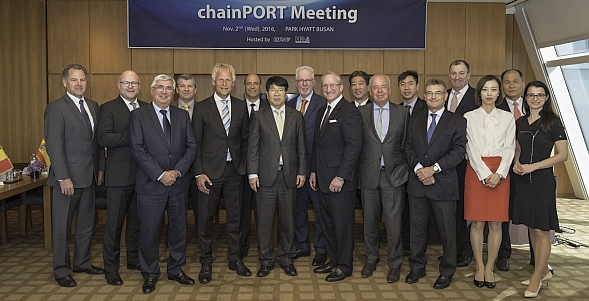HAMBURG JANUARY 2017
chainPORT GATHERS MOMENTUM AS PORT LEADERS
COMMIT TO STRONG 2017 WORK PROGRAM
The partnership is driven by several key working groups reporting to a steering committee comprising the CEO’s and Presidents from the member ports. The working groups focus on a range of subjects including smart IT solutions, the implications, and solutions for ultra large container vessels and shaping digital change in port authorities (people & processes).

CLICK IN PICTURE FOR GROUP CAPTION
Planning is at an advanced stage for the development of a chainPORT Academy. The Academy offers employees of participating ports access to continuing professional education and gives them access to a multidisciplinary network of professionals from chainPORT’s.
chainPORT partners are also actively developing chainLOG, an online portal which catalogs in searchable database details of logistics service providers in each individual port community. The resource enables ports and companies to promote and interconnect their business with customers and service providers from the international maritime environment.
chainPORT representatives will meet both virtually and in person throughout 2017. The next meeting will take place at The International Association of Ports and Harbors (IAPH) worldwide conference in Indonesia in May. Port of Los Angeles will host the Annual Meeting of chainPORT in November.
About chainPORT
About chainPORT
chainPORT has been developed in response to the changing economic and ecological landscape facing the maritime sector, including economic shocks impacting trade volumes, challenges posed by mega vessels, the emergence of IT megatrends and more stringent environmental standards.
Port authorities in their position as ‘trusted and honest brokers’ are being increasingly relied upon by cargo owners, shipping lines, and modal operators to perform the function of coordinators and communicators in support of supply chain optimization. This development is being driven by cargo owner’s interests and expectations for door-to-door rather than traditional port-to-port solutions.
Locally, port authorities are responding to this demand by leveraging their position to develop port community systems, which gather, collate and share data from the various stakeholder groups within their ports to aid better coordination, communication, and control around cargo flow. Data is shared with appropriate parties on a need to know basis (without commercial infringement) in the best interest of the local supply chain.
chainPORT partners are committed to leveraging the latest developments in technology to realize their vision of a smart, interconnected and digital world port system. The initiative brings together like-minded port professionals to share with, learn from and benchmark with each other their respective experiences in their newfound role of supply chain optimizers.

